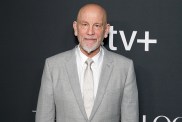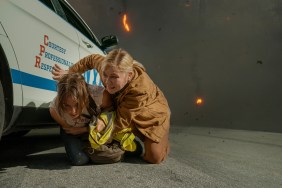I traditionally dislike script reviews. I don’t like knowing too much about films before they come out, but my interest in Oliver Stone‘s biopic on current President George W. Bush interests me so much I had to pull a serious case of hypocrisy and read it from cover-to-cover in a matter of hours. In this review I won’t spoil the story, but there may be a few details you don’t want to hear about, but then again this isn’t an action packed superhero flick, it’s a talky picture that bounces back-and-forth in time telling the rise of George W. from his days at Yale (1966), to his courtship of Laura Welch (1977), his help with his father’s Presidential campaign (1986), his run for Governor in Texas (1993) and his order to begin “Operation Iraqi Freedom”, the fall of Saddam Hussein and the subsequent aftermath.
The script I read is dated October 15, 2007, and is an original story and screenplay by Stanley Weiser. At the time the title of the film was Bush, but it has since come to be known simply as W. Weiser co-wrote Stone’s Wall Street back in 1987 and more recently penned the Rudy Giuliani biopic “Rudy: The Rudy Giuliani Story” in 2003.
For a quick opinion of the script I can tell you I liked it, but have major reservations. The biggest issue is going to be disconnecting with the George W. Bush we all picture. Bush has become a punch line, everyone has an imitation of our current president; he isn’t difficult to mock. This fact will make it difficult to realize that the guy stumbling through his speeches is the frat boy swigging screwdrivers from a trash can and swearing like a sailor in the Oval Office.
People are used to seeing Bush mocked and made fun of for his poor grammar and for the dimwit he appears to be. There are instances of improper grammar in the script such as the infamous “is our children learning?” line, his pronunciation of nuclear as “nu-cu-lar” is used often, Machiavellian as Michievellian and his inability to correctly say such a common phrase as “Be that as it may” in a one-on-one conversation with Tony Blair (Blair helps him out). Traditionally these kinds of things would be laughed at, but in this script you almost pity the man.
As for pace, the film is very talky with little action, which is to be expected. Outside of a few bombs being dropped and stock footage of the fall of the Saddam Hussein statue in Baghdad we find ourselves in the Situation Room, on the campaign trail or drunkenly staggering around Bush Sr.’s front lawn.
Everything presented adds up to one thing — Bush comes off as a guy that simply doesn’t want to be beat — by anyone. He doesn’t want to live in his father’s shadow. He doesn’t like to be challenged. He jumps the gun and it ultimately backfires on him time and time again. Early on it is his drunken care free nature that gets him into trouble. Later on it is his refusal to lose and attempts to show up his father that come back to bite him. The story doesn’t do any finger pointing of its own, but it does allow for several instances where an audience member can easily make up their own mind.

The title W seems a bit short and obscure, but once you find out how Dubya refers to the majority of folks he deals with you will get the point. This guy has a nickname for everyone:
- Tony Blair – Tones
- Donald Rumsfeld – Rummy
- Colin Powell – Balloon Foot
- Karl Rove – Turdblossom
As for a few other events referenced in the film the Brent Scowcroft article from the “Wall Street Journal” plays a significant role in one scene (playing up the Jr. vs. Sr. aspect) and the following Willie Horton ad gets a considerable bit of credit:
As does his May 1, 2003 speech from the deck of the USS Lincoln (“Mission Accomplished” in the background):

Some interesting roles are still left open including Dick Cheney (Robert Duvall is rumored), Colin Powell (Jeffrey Wright is rumored) and Donald Rumsfeld (Tommy Lee Jones is rumored). It will also be interesting to see who gets the role of Tony Blair, perhaps Michael Sheen would consider joining the cast for one day.
The main thing the film has to contend with is that Bush has become a source of comedy, whether it is his own doing or as an SNL spoof. I think it will be hard for audiences to see him as a real person making real decisions, even if they are decisions that reflect the President we have come to know, and apparently extremely disapprove. While reading I had a few laughs at all the eye-rolling over Bush’s grammatical errors, and the script certainly humanizes him, but it turns him into some quick draw egomaniac surrounded by a bunch of “yes” men scared to tell him what he doesn’t want to hear.
A question I had while reading made me wonder how accurate it was. Personally I have no clue. Several of the scenes present a lot of behind-closed-doors conversations, none of which I can say scripter Stanley Weiser was in on. If the film is made “as-is”, it will certainly be rated-R for language alone, sex and violence however play no real role.
Oliver Stone, however, will definitely get his chance to do his thing as the entire film is held together through Bush’s love of baseball. A reoccurring scene has Bush alone at Rangers Stadium, left to his thoughts and day-dreams. The situation alone will give Stone free reign to potentially go on one of his acid trips like he did in Alexander (kaleidoscope vision) and World Trade Center (Jesus and the water bottle). However, if I can give one suggestion to Stone referring to one of these day-dreams… let the ball drop, and that’s all I will say.
Considering the decisions Bush made on the war and how he came about making them, releasing this film in November (which is apparently the plan), just prior to the elections, really could affect John McCain’s candidacy as he supports the decisions made by the Bush regime. We’ll have to see as production is set to begin this month.










